Abortion decriminalised in Northern Territory after long campaign

The Northern Territory has decriminalised abortion and widened access for women, including use of the RU486 termination drug.
After a years-long public campaign and failed attempts during the previous administration, the Labor-led parliament voted 20 votes to four on Tuesday in favour of a bill to amend the NT Medical Services Act and the criminal code. Labor members were given a conscience vote.
The amended laws will remove requirements for all terminations to occur in hospitals, and ensure RU486 is available outside a hospital setting within the first nine weeks, meaning that women living in remote areas will no longer have to travel vast distances to hospitals in Darwin or Alice Springs.
They still require the approval of a doctor for a termination of pregnancies up to 14 weeks, and two doctors for between 14 and 23 weeks.
They also ensure any health provider who conscientiously objects to abortion refers patients to a doctor who doesn’t, and provides for “safe access zones” around premises where terminations are performed.
“We believe all territory women are entitled to control over their lives and access to high-quality services,” said the health minister, Natasha Fyles. “These are important, community-driven changes.”
The chief minister, Michael Gunner, said the old laws were “excessively restrictive” and unintentionally discriminated against women in the NT.
“Here in the territory we have led the nation in progressive reform, unfortunately on this issue we have lagged intolerably behind, and to the detriment of the rights and health of territory women,” he said.
The bill also updated the criminal code to decriminalise abortions, leaving Queensland and New South Wales as the only Australian jurisdictions where abortion remains a criminal offence.
In NSW an abortion is allowed if doctors reasonably believe it’s necessary to avoid serious danger to a woman’s life or her physical or mental health. Last month a bill to decriminalise abortion was withdrawn from the Queensland parliament after Liberal National members said they would vote against it.
Dr Suzanne Belton, of the What RU4 NT lobby group, told Guardian Australia it was a “historic” day. “It really means that NT women have been taken seriously,” she said. “There was previously discrimination.”
Belton noted that the bill changed laws which required an adolescent to have consent from both parents before gaining a termination. “It’s very important for young people to know that [they don’t have to involve their parents],” she said. “In some cases, in some families, that’s not appropriate for the adolescent.”
The NT bill prompted emotional debate. The independent MLA Gerry Wood took a stand against all kinds of abortion, equating it to domestic violence.
Wood proposed a number of amendments, including a reduction in penalties for people charged with harassing women in a safe access zone, and mandatory counselling before an abortion, under penalty of jail time. No amendments were accepted by the government.
He has previously described abortion as a “fashion” and a “pathway to a coroner”.
Wood was supported in his opposition by a fellow independent and former chief minister, Terry Mills. The independent MLA Mark Guyula and the Labor minister Gerry McCarthy also voted against the bill.
The deputy opposition leader, Lia Finocchiaro, said it was time medical termination was “an option for women facing one of the biggest decisions in their lives, subject to adequate clinical guidelines set in a Northern Territory context”.
Much of the debate on Tuesday and last year focused on the impact it would have on Indigenous women, particularly those living in remote communities. Selena Uibo told parliament she stood “as a young Aboriginal woman who wants the same rights as my fellow female Australians in every other state and territory”.
Uibo said she was appalled that the bill was being diverted from an issue about gender equality into one about race.
“Aboriginal women, believe it or not, are diverse in nature, opinion, culture, language, beliefs, needs and wants,” she said. “I was alarmed that some suggestions by lobbyists that Aboriginal women are not educated enough to make decisions for themselves.”
Uibo also said she hoped those who had lobbied from interstate for the rights of Territorians would be as enthusiastic about addressing the many other inequalities faced by remote communities.
The Namatjira MLA, Chansey Paech, tabled a media release by Margaret Tighe of the Melbourne-based Right to Life activist group which he described as “offensive and racist”. The release said “widespread provision” of terminations would “frequently be seized upon by those social engineers who wish to control the Aboriginal population because of the rising cost of Aboriginal welfare”.
“Her ignorance of this bill and of the reality of access to safe reproductive health services by Aboriginal women living in remote communities is apparent,” Paech said.
The human rights law centre welcomed the result but said it didn’t completely decriminalise abortion and still didn’t give women complete control over decision-making.
Adrianne Walters, director of Legal Advocacy said NT women still ran the risk of prosecution for late-term abortions, even if, for example, the foetus had a fatal abnormality or the pregnancy was a product of rape.
“Using the criminal law as a tool to regulate abortion at any stage of a woman’s pregnancy is hopelessly outdated, discriminatory and bad for women’s health,” said Walters.
Walters said requiring two doctors’ approval was medically unnecessary and paternalistic and “tells women they can’t be trusted to make decisions about their own bodies”.
The new laws are expected to be in place by mid-year, coinciding with the release of clinical guidelines which were not available for public consultation before Tuesday’s debate.

 Yahoo News
Yahoo News 
